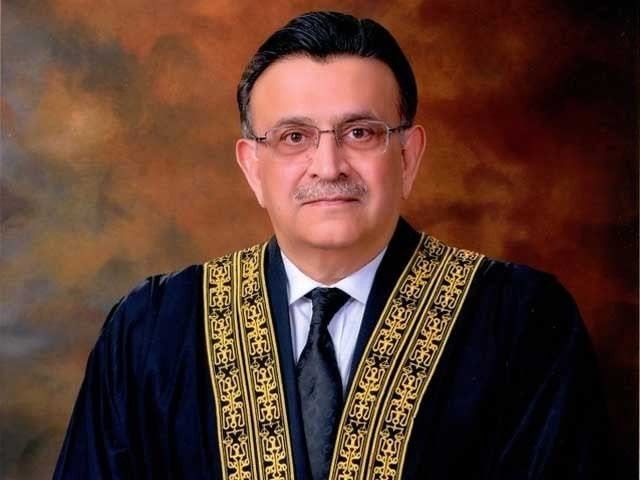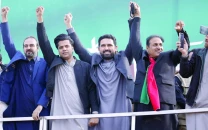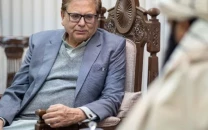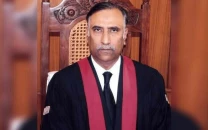CJ throws out AGP’s objection to bench
Chief Justice Bandial observes ECP has no authority to extend election date

Chief Justice of Pakistan Umar Ata Bandial on Tuesday overruled the objection raised by Attorney General for Pakistan Usman Awan about the bench hearing the PTI’s petition as a "technical point" to be raised in a separate application.
The apex court resumed hearing on a PTI petition challenging the Election Commission of Pakistan’s decision to postpone the election to the Punjab Assembly till October 8.
A five-member larger bench, headed by the chief justice, and comprising Justice Ijazul Ahsan, Justice Munib Akhtar, Justice Aminuddin Khan and Justice Jamal Khan Mandokhail is seized with the matter.
“Elections are necessary for democracy … don’t spoil the matter on technical grounds,” the chief justice told the AGP. “The Supreme Court’s March 1 order has already been implemented. Don’t raise this matter or present it in court again.”
At the outset of the hearing, the chief justice welcomed General of Pakistan (AGP) Usman Awan and said that the court looked forward to receiving assistance for him.
Justice Syed Mansoor Ali Shah and Justice Jamal Khan Mandokhail on Monday had cast doubt on the judgement handed down in the March 1 suo motu regarding elections in Khyber Pakhtunkhwa and Punjab, saying that the proceedings stood dismissed by a majority of 4-3, and contended that the chief justice of Pakistan did not have the power to restructure benches without the consent of the respective judges.
The attorney general, while mentioning the dissenting notes of brother judges, questioned the maintainability of the petition. He argued that the matter related to the election should be referred to the Lahore High Court after two apex court judges issued their detailed opinion wherein they held that the earlier suo motu in the matter was dismissed 4:3.
He said that the LHC had not given the president the authority to announce the election date. The AGP also requested the court to constitute a full bench to adjudicate the case.
However, the chief justice Bandial held that the opinion expressed by the two judges was not relevant in the instant matter.
"If the verdict was 3:4, then the 'breached' orders do not exist," responded the attorney general. "In fact, if there were no court orders, then the president had no authority to give an election date even," he added, urging the court to first settle the issue of Supreme court’s March 1 orders.
The chief justice observed that the AGP's arguments were based on a "technical point" while the bench was seeing the question raised in the application.
He also asked the AGP to refrain from “complicating" the matter by asking questions that would delay the proceedings.
The chief justice asked Awan to raise such points in a separate application, saying that the issue before the court was not about "the fixing of the election date; rather the postponement of the election date".
Moreover, Justice Manokhail pointed out that “the number of judges [who issued] the March 1 judgement is Supreme Court’s internal matter”.
Reacting to the comment, the chief justice thanked Justice Mandokhail for “clearing the matter”.
Read ‘One-man show’: CJ’s discretionary powers in spotlight
Tuesday’s proceeding was mostly consumed by the question whether the ECP as a constitutional body mandated to alter the election date and that too beyond the 90-day limit on its own.
On the matter, Federal Law Minister Azam Nazeer Tarar maintained that the ECP is independent of all orders. "We had said it on the first day, the verdict is 3-4," said the minister as he reached the SC premises, "the ECP was merely doing its job as per Article 218(3)".
The chief justice observed that prima facie the Election Commission of Pakistan (ECP) “has no authority to extend election date”.
The chief justice observed that the present case was a completely different matter wherein, the apex court was examining whether the ECP had the authority to postpone the election date.
“We don’t want to stretch the matter,” he stated and said that the question in front of the court was simple: Can the election date be extended or not? “If the ECP has the authority [to extend the date] then the proceedings end right here.”
Justice Mandokhail remarked that the court would examine how the ECP was empowered to extend the election date.
Justice Aminuddin Khan questioned whether the election schedule could be "reduced to less than 90 days", while Justice Ijazul Ahsan observed that the ECP "has the right to adjust the election schedule within 90 days", but added that it could not exceed the 90-day limit.
"Ninety days have been surpassed even now," observed Justice Mandokhail, adding that polls "must take place under all circumstances but now the question is who will exceed the election date beyond the 90-day limit".
"The other question is, should an assembly be dissolved at the whims of one person alone," remarked Justice Mandokhail.
The chief justice pointed out that the security personnel in K-P conducted the highest number of operations. He revealed that 61 operations in Punjab, 367 in Sindh and 1,245 operations were conducted in K-P.
Read more SC settles poll controversy
“The situation in Punjab is different than that in K-P,” the chief justice noted and gave the example of Turkiye, where he said elections were being held in all the areas that were not struck by the earthquake.
Barrister Zafar concurred and said that even the Election Act, 2017, highlighted that polling could only be cancelled in areas where problems existed. “It is not possible to postpone the entire elections.”
The judge stated that the polls could only be delayed if an emergency was imposed [in the country]. “Does the ECP order mention imposing an emergency?” he asked to which the PTI lawyer replied, “absolutely not”.
“Absolutely not was said by you [the PTI] to someone else,” the chief justice quipped, which led to laughter in the courtroom.
Discussing the paucity of funds to hold the election exercise, the chief justice proposed a pay cut for himself and other judges so that the “vital task” of holding elections across the country could be funded and completed.
“An entire budget is not required for elections … the government can cut back its expenditures and release Rs20 billion,” he said. “A Rs20 billion cut can be made in the salaries of judges.”
The chief justice highlighted that the country was in the midst of economic turmoil today and emphasised that sacrifice was needed to deal with the crisis. “A five per cent salary cut can cover the expenses of elections,” he said.
Justice Ahsan also questioned how could it be determined that the problems that existed today would not be there on October 8 as well.
The PTI lawyer replied that the ECP had said that it was not provided with funds for the elections to which Justice Akhtar stated that he had read a statement given by the prime minister in newspapers.
Also read 'Either Imran exists, or we do': Sana hints at PTI chief’s 'elimination'
“The federal government says that Rs500 billion tax was collected till February … it is surprising that out of Rs500 billion, Rs20 billion couldn’t be given [for elections],” the judge pointed out.
Barrister Zafar recalled that in its order, the ECP had quoted the finance secretary as saying it would be difficult to release the funds. “It is to be noted that Finance Ministry had used the word difficult, not rejected [the request].”
Justice Akhtar said that the finance secretary had stated that it did not have funds for elections today and in the future. “This means that elections will not take place at all. How can a government secretary issue such a statement?”
He also noted that after it was collected, the tax was deposited in the federal consolidated funds.
PPP’s Naek contended that federal consolidated funds were only spent with the approval of the Parliament to which Justice Akhtar asked: “If the assembly is dissolved, will the funds not be released?”
The lawyer replied that in the present scenario, a National Assembly was functioning, elaborating that a new assembly could approve the expenditure. “Only the ECP could provide an explanation for the finance secretary’s statement,” he added.
Justice Mandokhail also asked how the finance secretary could disburse funds beyond the approved budget to which Barrister Zafar said that this was a technical point.
"What would happen if the ECP reverses its decision and says nobody is supporting the electoral body in holding elections," inquired Justice Mandokhail.
"The commission will have to turn to the court to resolve the difficulties it faces," the judge observed.
Later, CJ Bandial questioned how elections could be delayed "for such a long period" by the electoral body.
"When Benazir Bhutto was martyred, elections were only delayed by 40 days," the judge observed, noting that at the time "protestors had set the ECP offices on fire" and "the entire country was in the grips of demonstrations".
The CJ stressed the need for "political stability" and "maturity" to hold elections.
"The ECP's decision was drafted with haste," he remarked, "the commission had no authority or legal provisions available to extend the election date".
PDM to become party in case
Meanwhile, Pakistan Peoples Party (PPP) Senator and former law minister Farooq Naek prayed that political parties be made party to the case, arguing that they were also "stakeholders" in the issue at hand.
Earlier, coalition parties in government decided to become parties to the case, whereby PPP, PML-N and JUI-F are expected to file their applications.



















COMMENTS
Comments are moderated and generally will be posted if they are on-topic and not abusive.
For more information, please see our Comments FAQ